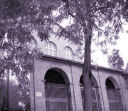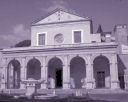Pope Francis. 29 September 2013
Fw: Rich man and Lazarus
Sancta Maria Abbey: http://www.nunraw.com.uk (Website)
Blogspot :http://www.nunraw.blogspot.co.uk |
Blogspot :http://www.nunraw.blogspot.co.uk |
domdonald.org.uk, Doneword www.donewill.blogspot.co.uk
----- Forwarded Message -----
From: Nivard ...
To: Donald 5 ...
From: Nivard ...
To: Donald 5 ...
Sent: Thursday, 5 March 2015, 16:48
Subject: Rich man and Lazarus
Subject: Rich man and Lazarus
Magnificat, extract Pope Francis, 2 Lent Thur 4 Mar 2015 Lk 16:19-31
Lazurus is in comfort while you are in agony
When we become complacent, we no longer remember God. If we don’t think about God, everything ends up flat, everything ends up being about ”me”, and my own comfort.
Life, the world, other people, all of these become unreal. They no longer matter. Everything boils down to one thing: having.
When we no longer remember God, we too become empty; like the rich man in the Gospel, we no longer have a face!
Those who run after nothing become nothing.

The Station is in the church of St. Mark, which was built in the fourth century in honor of the evangelist, by the holy Pope Mark, whose relics are kept there.
Pope Francis: homily at Mass for Catechists - News.va
www.news.va/en/news/pope-francis-homily-at-mass-for-catechistsPope Francis: homily at Mass for Catechists. Print. 2013-09-29Vatican Radio. (Vatican Radio) Pope Francis celebrated Mass on Sunday morning in St Peter's ...
2013-09-29 Vatican Radio
 (Vatican Radio) Pope Francis celebrated Mass on Sunday morning in St Peter's Square to mark the International Day for Catechists organised by the Pontifical Council for the Promotion of the New Evangelisation in the context of the Year of Faith. The dangers of complacency and the need for catechists to have the core and essence of the Gospel at the centre of their lives and work were the themes of the Holy Father's remarks. Below, please find the official English translation of the Holy Father's homily. Listen to our report:
(Vatican Radio) Pope Francis celebrated Mass on Sunday morning in St Peter's Square to mark the International Day for Catechists organised by the Pontifical Council for the Promotion of the New Evangelisation in the context of the Year of Faith. The dangers of complacency and the need for catechists to have the core and essence of the Gospel at the centre of their lives and work were the themes of the Holy Father's remarks. Below, please find the official English translation of the Holy Father's homily. Listen to our report:
*********************************
1. “Woe to the complacent in Zion, to those who feel secure … lying upon beds of ivory!” (Am 6:1,4). They eat, they drink, they sing, they play and they care nothing about other people’s troubles.These are harsh words which the prophet Amos speaks, yet they warn us about a danger that all of us face. What is it that this messenger of God denounces; what does he want his contemporaries, and ourselves, to realize? The danger of complacency, comfort, worldliness in our lifestyles and in our hearts, of making our well-being the most important thing in our lives. This was the case of the rich man in the Gospel, who dressed in fine garments and daily indulged in sumptuous banquets; this was what was important for him. And the poor man at his doorstep who had nothing to relieve his hunger? That was none of his business, it didn’t concern him. Whenever material things, money, worldliness, become the centre of our lives, they take hold of us, they possess us; we lose our very identity as human beings. The rich man in the Gospel has no name, he is simply “a rich man”. Material things, his possessions, are his face; he has nothing else.Let’s try to think: How does something like this happen? How do some people, perhaps ourselves included, end up becoming self-absorbed and finding security in material things which ultimately rob us of our face, our human face? This is what happens when we no longer remember God. If we don’t think about God, everything ends up being about “me” and my own comfort. Life, the world, other people, all of these become unreal, they no longer matter, everything boils down to one thing: having. When we no longer remember God, we too become unreal, we too become empty; like the rich man in the Gospel, we no longer have a face! Those who run after nothing become nothing – as another great prophet Jeremiah, observed (cf. Jer 2:5). We are made in God’s image and likeness, not that of material objects, not that of idols!
2. So, as I look out at you, I think: Who are catechists? They are people who keep the memory of God alive; they keep it alive in themselves and they are able to revive it in others. This is something beautiful: to remember God, like the Virgin Mary, who sees God’s wondrous works in her life but doesn’t think about honour, prestige or wealth; she doesn’t become self-absorbed. Instead, after receiving the message of the angel and conceiving the Son of God, what does she do? She sets out, she goes to assist her elderly kinswoman Elizabeth, who was also pregnant. And the first thing she does upon meeting Elizabeth is to recall God’s work, God’s fidelity, in her own life, in the history of her people, in our history: “My soul magnifies the Lord … For he has looked on the lowliness of his servant … His mercy is from generation to generation” (Lk 1:46, 48, 50). This canticle of Mary also contains the remembrance of her personal history, God’s history with her, her own experience of faith. And this is true too for each one of us and for every Christian: faith contains our own memory of God’s history with us, the memory of our encountering God who always takes the first step, who creates, saves and transforms us. Faith is remembrance of his word which warms our heart, and of his saving work which gives life, purifies us, cares for and nourishes us. A catechist is a Christian who puts this remembrance at the service of proclamation, not to be important, not to talk about himself or herself, but to talk about God, about his love and his fidelity - to speak and to transmit all that God has revealed, i.e. the teaching of Christ and His Church in its totality, neither adding nor subtracting anything.
Saint Paul recommends one thing in particular to his disciple and co-worker Timothy: Remember Jesus Christ, raised from the dead, whom I proclaim and for whom I suffer (cf. 2 Tim 2:8-9). The Apostle can say this because he too remembered Christ, who called him when he was persecuting Christians, who touched him and transformed him by his grace.
The catechist, then, is a Christian who is mindful of God, who is guided by the memory of God in his or her entire life and who is able to awaken that memory in the hearts of others. This is not easy! It engages our entire existence! What is the Catechism itself, if not the memory of God, the memory of his works in history and his drawing near to us in Christ present in his word, in the sacraments, in his Church, in his love? Dear catechists, I ask you: Are we in fact the memory of God? Are we really like sentinels who awaken in others the memory of God which warms the heart?3. “Woe to the complacent in Zion!”. What must we do in order not to be “complacent” – people who find their security in themselves and in material things – but men and woman of the memory of God? In the second reading, Saint Paul, once more writing to Timothy, gives some indications which can also be guideposts for us in our work as catechists: pursue righteousness, godliness, faith, love, endurance, gentleness (cf. 1 Tim 6:11).
Catechists are men and women of the memory of God if they have a constant, living relationship with him and with their neighbour; if they are men and women of faith who truly trust in God and put their security in him; if they are men and women of charity, love, who see others as brothers and sisters; if they are men and women of “hypomoné”, endurance and perseverance, able to face difficulties, trials and failures with serenity and hope in the Lord; if they are gentle, capable of understanding and mercy. Let us ask the Lord that we may all be men and women who keep the memory of God alive in ourselves, and are able to awaken it in the hearts of others. Amen.











 The Gospel is from St. Mark 9:2-10. This vision of Christ glorified, given to these Apostles on Mount Thabor (the traditional site of Transfiguration) was surely a very special privilege, and it was one they did not forget. "We saw his glory," St. John says in his gospel, written over sixty years later. In his epistles John also refers to this privilege (1 Jn. 1:1-4). St. Peter, writing from Rome to the churches in Asia Minor about thirty years later, mentions this outstanding experience: "For we were not following fictitious tales when we made known to you the power and coming of our Lord Jesus Christ, but we had been eyewitnesses of his majesty. For he received from God the Father honor and glory, when from out the majestic glory a voice came down to him saying: ‘this is my beloved Son in whom I am well pleased.’ And this voice we ourselves heard borne from heaven when we were with him on the holy mountain" (2 Pt. 1:16-18).
The Gospel is from St. Mark 9:2-10. This vision of Christ glorified, given to these Apostles on Mount Thabor (the traditional site of Transfiguration) was surely a very special privilege, and it was one they did not forget. "We saw his glory," St. John says in his gospel, written over sixty years later. In his epistles John also refers to this privilege (1 Jn. 1:1-4). St. Peter, writing from Rome to the churches in Asia Minor about thirty years later, mentions this outstanding experience: "For we were not following fictitious tales when we made known to you the power and coming of our Lord Jesus Christ, but we had been eyewitnesses of his majesty. For he received from God the Father honor and glory, when from out the majestic glory a voice came down to him saying: ‘this is my beloved Son in whom I am well pleased.’ And this voice we ourselves heard borne from heaven when we were with him on the holy mountain" (2 Pt. 1:16-18).